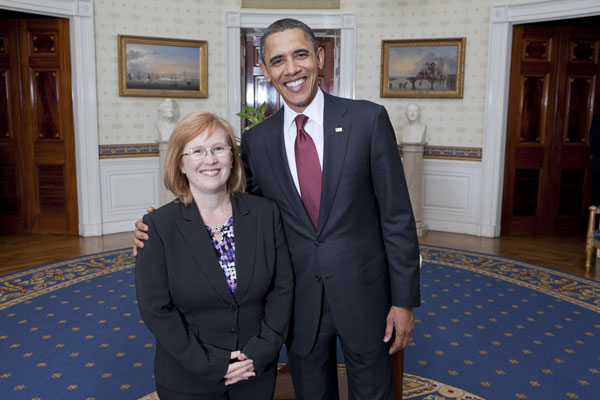 Valerie Belon, U.S. Consul General in Curacao since August 2010, met with U.S. President Barack Obama during an official trip to Washington in February. During her visit, Consul General Belon participated in a regional conference of Chiefs of Mission from Latin America and the Caribbean followed by the first-ever Global Chiefs of Mission Conference. Secretary of State Hillary Rodham Clinton convened this unprecedented Global Chiefs of Mission Conference to gather U.S. Ambassadors from around the world simultaneously to discuss common challenges, to share experiences, and to better understand the goals and conclusions of the State Department's recently-released Quadrennial Diplomacy and Development Review (QDDR).
Valerie Belon, U.S. Consul General in Curacao since August 2010, met with U.S. President Barack Obama during an official trip to Washington in February. During her visit, Consul General Belon participated in a regional conference of Chiefs of Mission from Latin America and the Caribbean followed by the first-ever Global Chiefs of Mission Conference. Secretary of State Hillary Rodham Clinton convened this unprecedented Global Chiefs of Mission Conference to gather U.S. Ambassadors from around the world simultaneously to discuss common challenges, to share experiences, and to better understand the goals and conclusions of the State Department's recently-released Quadrennial Diplomacy and Development Review (QDDR).The QDDR provides a blueprint for elevating American "civilian power" to better advance U.S. national interests and to be a better partner with the U.S. military. Leading through civilian power means directing and coordinating the resources of all America's civilian agencies to prevent and resolve conflicts; to help countries lift themselves out of poverty into prosperous, stable, and democratic states; and to build global coalitions to address global problems. This applies all around the world, including in the Dutch Caribbean. For example, in Curacao the U.S. Air Force operates the U.S. Forward Operating Location (USFOL) which plays an important role in counter-narcotics efforts. Simultaneously, U.S. civilian power – represented by the State Department, the Drug Enforcement Agency, and other agencies – paves the way for the USFOL's successful counter-drug efforts, working directly with local and regional partners. Civilian leaders work side-by-side with law enforcement in the Dutch Caribbean to reduce drug trafficking and its associated crime. Civilian leaders also engage local organizations on such global issues like trafficking in persons and human rights.
Secretary Clinton summarized the QDDR's conclusions this way: "We will build up our civilian power: the combined force of civilians working together across the U.S. government to practice diplomacy, carry out development projects, and prevent and respond to crises. Many different agencies contribute to these efforts today, but their work can be more unified, more focused, and more efficient. The State Department and USAID will take a lead role in making that happen."
The 2011 Global Chiefs of Mission Conference gave participants an unprecedented opportunity to mobilize and coordinate the work of America's Ambassadors overseas. While addressing the Chiefs of Mission, Secretary Clinton expressed her positive view of "volume of conversation that is occurring." She said, "It's one of the ancillary benefits that we hoped would occur because of the opportunity for people to come together and share ideas." The Conference ended at the White House, where Consul General Belon was able to meet directly with President Obama.












